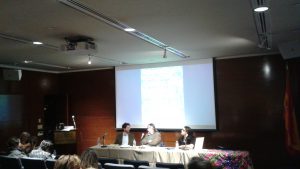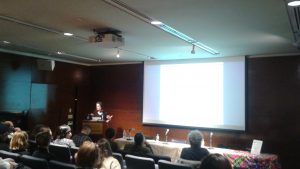Speakers:
- Federico Finchelstein (The New School): Professor of History
- Sara R. Farris (Goldsmiths, University of London): Senior Lecturer on Sociology.
- Carlos de la Torre (University of Kentucky)
- Sahar Abi-Hassan (Boston University) PhD candidate, whose research focuses on political institutions.
 The conference Populism, Gender and Language: Lessons from Latin America and Beyond was hosted by New York University’s Center for Latin American and Caribbean Studies (CLACS). It examined the role of gender in populism. Populism, Gender and Language was a part of Dr. Pamela Calla’s Feminist Constellations, which focus on broader topics relating to Latin America and beyond from a feminist perspective. CLACS professor Amy Huras introduced the speakers. The prevalence of populism in the global political landscape made Populism, Gender and Language an important educational experience for those that are trying to understand the recent rise of populist governments across the globe.
The conference Populism, Gender and Language: Lessons from Latin America and Beyond was hosted by New York University’s Center for Latin American and Caribbean Studies (CLACS). It examined the role of gender in populism. Populism, Gender and Language was a part of Dr. Pamela Calla’s Feminist Constellations, which focus on broader topics relating to Latin America and beyond from a feminist perspective. CLACS professor Amy Huras introduced the speakers. The prevalence of populism in the global political landscape made Populism, Gender and Language an important educational experience for those that are trying to understand the recent rise of populist governments across the globe.
Populism, Gender and Language examined the importance of Latin American populist movements and how they inform the 2016 United States presidential election. Dr. Finchelstein was the moderator. He regarded populism as an issue that is present in democratic societies. Finchelstein raised the question: What are the lessons that could be learned from the study of populism? Populism in Latin America is something that has existed for a long time. According to Finchelstein, the US shows far less of a history of persistent federal populism. Furthermore, Finchelstein stated that the U.S. president, Donald Trump presented himself as a “macho” leader. This is something that he has in common with populist leaders in Latin American from Juan Perón to Hugo Chávez.

According to Dr. De la Torre populists in Latin America share an attachment to authoritarian forms of governance but are still democratic. They use an extreme presentation of political religion and produce a narrative of an apocalyptic vision of their current political landscape as a means of ascending to power. Populist leaders claim not to be politicians. Furthermore, the populist leader speaks for the “people”, represents them until they (the leader and his supporters) become one and as a result the leader can appropriate their voices.
The speakers stressed the importance that gender representation plays in populist politics. Populist have different gender projects. Populist construct a macho world; ruled by masculinity. For example, the Peronist populist movement in Argentina dismissed feminism as an ideology of the enemy: the elite. Eva Perón, or Evita as she is famously known, stated that “the role of women is to be at home and alongside their husbands.”

Sahar Abi Hassan stated that the relationship between gender and populism is under studied. Most studies regarding populism have mainly focused on the policies of populist governments. She elaborated by stating that populist leaders use an opportunistic approach regarding gender to facilitate their moral distinction between the “people” and the “elite.”
In Latin America, populism is shaped by the lack of a democratic process. In contrast, in Europe there is a focus on “Europeanism” and the preservation of culture. Populism subordinates/subjugates personal identity and in turn gender, which is an identity. Voting rights are appropriated as a political tool. Hassan ended her portion of the presentation by posing the question: What is the gender support of populist movements? In Latin America the answer is inconclusive because of a lack of data.
De la Torre presented his view that the populist aim is to keep power; populism needs a leader. Some populist movements seek to include the exclude. In the West, populist leaders seek to exclude the disenfranchised. De la Torre and Finchelstein argue that this might be a product of the west’s colonial history.
Sara R. Farris joined the conversation via an audio recording. She discussed the rise of “femonationalism” in Europe and the United States. These movements use feminism as a tool to target Muslims and their beliefs. They label Islam as dangerous and a threat to democracy. Dr. Farris concluded by stating that populism is not useful when trying to understand the gender project of right wing populism. Carlos de la Torre disagreed with Farris view of populism, which he argued form the perspective of the global north. He also stated that Farris’ analysis would benefit from studying the complexities of populist movements in Latin America.
After the individual presentations the speakers discussed gender as an integral part of populist movements and politics, and the links between nationalism and populism. The agreed that citizens of United States can understand the country’s current political situation by studying populism in Latin America. Latin America gave birth to modern populism exemplified by Peronism in the 1940s and Chavismo in the early 2000s.
Populism, Gender and Language ended with questions from the audience. Two notable questions where: How does populism change the political discourse regarding gender? The speakers answered that it is important to look at how grassroots movements use populist discourse and push for their interest within the confines of the rhetoric. Further, what is the role of religion in populist movements? To which all the speakers unanimously answered that religion is a tool use by populist for political gain.
Latin American populism has always been gendered and racialized. Populism is ambiguous to everything, but also very exclusionary to the “enemy” or the “elite.” Populism is an amalgamation where voters favor the things that matter to them. The most recent populist leaders in Latin America, Chavez, Corea, and Morales, use the rhetoric of revolution to attract the young.

